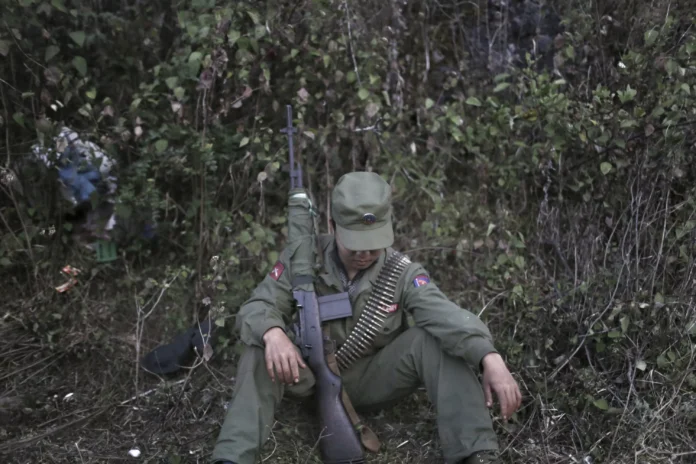A Myanmar ethnic minority armed group, known as the Ta’ang National Liberation Army (TNLA), has recently made headlines after executing six men in a public trial in an enclave near the China border. This incident has sparked outrage and concern among the international community, as it raises questions about human rights violations and the rule of law in the region.
According to media outlets affiliated with the TNLA, the six men were accused of being informants for the Myanmar military, also known as the Tatmadaw. The TNLA, which is predominantly made up of ethnic Ta’ang people, has been engaged in a long-standing conflict with the Tatmadaw, fighting for greater autonomy and rights for their community.
The public trial and subsequent execution of the six men took place in the TNLA-controlled area of Namkham, located in the northern Shan State. The TNLA’s spokesperson, Colonel Tar Phone Kyaw, stated that the men were given a fair trial and were found guilty of providing information to the Tatmadaw, which resulted in the deaths of several TNLA soldiers.
The TNLA’s decision to hold a public trial and execute the men has been met with criticism from human rights groups and the international community. The United Nations has called for an independent investigation into the incident, expressing concerns about the lack of due process and the use of the death penalty.
In response to these criticisms, the TNLA has defended its actions, stating that the men were given a fair trial and were executed in accordance with their own laws and customs. The TNLA also accused the Tatmadaw of committing similar atrocities against their people and stated that they were simply defending their community.
This incident has once again brought attention to the ongoing conflict in Myanmar’s northern Shan State, where several ethnic armed groups are fighting for greater autonomy and rights for their communities. The TNLA, along with other ethnic armed groups, have been engaged in peace negotiations with the Myanmar government for several years, but a lasting solution has yet to be reached.
The Myanmar government has condemned the TNLA’s actions and has called for an end to the violence in the region. In a statement, the government expressed its commitment to finding a peaceful resolution to the conflict and urged all parties to engage in dialogue.
The TNLA’s actions have also been met with condemnation from the international community. The European Union has called for an immediate end to the violence and urged all parties to respect human rights and the rule of law. The United States has also expressed its concern and called for a transparent investigation into the incident.
The TNLA’s decision to execute the six men has raised questions about the use of the death penalty and the lack of due process in the region. It is important for all parties involved to respect human rights and the rule of law, and to work towards a peaceful resolution to the conflict.
In conclusion, the recent execution of six men by the TNLA in Myanmar’s northern Shan State has sparked international concern and condemnation. The incident highlights the ongoing conflict in the region and the need for a peaceful resolution. It is crucial for all parties to engage in dialogue and work towards a lasting solution that respects the rights and autonomy of all ethnic groups in Myanmar.


